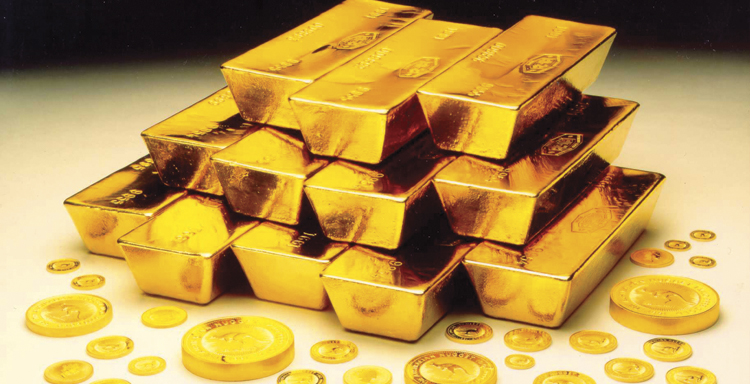Gold's properties are almost unique. It doesn't rust or corrode. Ordinary acids can't dissolve it. It is the most malleable and ductile metal known and it has a fascination to the human eye beyond its mere value.
There is something about gold in the flesh, as it were, that operates on the human psyche like nothing else on earth. Worked and figured gold jewellery, unadorned with precious stones, has a quality all its own. Gold coins look like they are worth something - even in today's world where gold currency is virtually unknown. And gold bullion in the form of fat, massy, slick gold bars conveys a feeling of wealth that no handful of diamonds or emeralds or bundle of folding stuff can ever do.
Gold is heavy of course, but how heavy is always a bit of a shock. Even bullion-vault workers need to remind themselves occasionally how heavy a bar of gold is. It isn't as simple as sheer weight. A 50 Kg bar weighs only 50Kgs after all, but all the weight is in your fingers.
Just ask the comedians that the bullion companies employ to conduct vault tours. There is always someone in the tour who will ask for a free sample. Dead-pan, the tour guide will say “Sure. Pick any bar you like”. Whereupon the likely lad latches onto a standard 50Kg bar and gets exactly 3 inches with it before it slips from his fingers and thuds back down onto the stack. Gold as an investment is a pure and simple capital value speculation.
It doesn't earn interest - all that you can hope is that it will be worth more when you sell it than it cost you to buy it. In the meantime you've got to incur the costs of protecting it. On the other hand, it has proved to be a reasonable store of value over the long term, and in the short term has provided the speculator with enough price-movement volatility to make the chance of grabbing a quick profit an intriguing possibility.
For many, gold is a comforting commodity to retreat to when the world seems to be heading to hell in a hand-cart, or when inflation seems to be moving out of control.
For others yet, Gold is just another currency - a hedge against weakness elsewhere - but these are not people for whom physical gold has any particular appeal.
You can own and trade in gold without actually taking possession. There are two gold-linked securities traded on the ASX. Each is linked to physical gold elsewhere and each charges holders a fee, and every transaction will attract a commission.
In Hong Kong, home of 6 ½ million gold bugs, it is possible to get bank accounts denominated in gold. No annual charges, no commissions and trading spreads of 0.33%. It doesn't get better than this for paper gold.
But it is physical gold that brings the real glint to the eye. You have to pay a premium to actually get your hands on the gold itself, but the premiums are negotiable. Average spreads for small (1oz to 100g) coins or bars are quoted at 5% between buy and sell, but there is no need to pay this kind of retail mark-up, especially if you make it clear that you are a serious investor.
There is a half-way house - buy the physical gold, but leave it with the firm you bought it from. Some will charge you a fee, some don't. Leaving your gold with the vendor calls into question the credit-worthiness of the vendor.
Buying from the Perth Mint on the other hand, because they are guaranteed by the West Australian Government, is perhaps the safest physical-but-don't-take-delivery option in Australia today - and their retail prices are no worse than anybody else's.
That there are some costs to obtain physical delivery is legitimate. Gold is precious and must be secured. Moving the stuff around, locking it up and insuring it, all cost money, but the whole point of buying physical gold is to get it in your hands so that you can enjoy the pleasure of possession. And if you want to round out the experience, visit Perth Mint and watch your own gold bar being poured and take it home with you.
